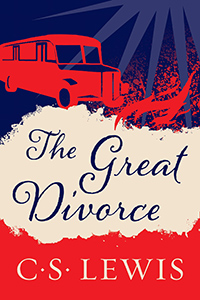
C.S. Lewis is a brilliant writer. That will never be up for debate and would be foolish to do so. His most memorable and renowned work has been for his children's book series, The Chronicles of Narnia. That series alone has captured the imaginations of past and present generations. But his fiction and nonfiction work for adults has not always been able to share that same stage. I was not sure why at first, because I have appreciated some of his work such as, A Grief Observed and The Abolition of Man.
But after reading The Great Divorce, I can now see why some of his work has taken a back seat to his prominent children’s fantasy books. For the first time, I struggled to understand and appreciate what Lewis was trying to communicate. I was not completely lost. I could generally understand what Lewis was writing about. But that was it. If I had read this brief 160-page entry a second or third time, I could have grown to appreciate it more. But I don’t believe readers should have to do that. I will be charitable and say the difficulty to understand spawned from the subject matter itself; The afterlife.
The clever title suggests how there is no marriage between Heaven and Hell. They are completely different with no possible way for either to co-exist. They are both completely separate. But what is The Great Divorce trying to communicate? It is complex because it is Lewis’ vision of purgatory. In simplest terms, purgatory is a state or place after death where souls go through this purification process of suffering to atone for any sins before they can access or reach heaven. That is the first reason I struggled with this subject because the word “purgatory” is not mentioned anywhere in the Bible. But, some Christians argue the concept and idea of purgatory are insinuated and alluded to in parts of scripture.
Lewis’s heavy symbolic and allegorical style of writing resembles the Apostle John from the book of Revelation. Both Lewis and John were inspired by a dream or vision they had. They both recorded everything they could see and hear. Also, both authors speak on the afterlife to some degree. This is why some (including myself) will struggle to understand the meaning and ideas behind this type of writing.
Lewis’s idea and vision of purgatory is one of fantasy, and rightfully so. He gives the illusion that people who have died and are in purgatory, are given another opportunity to decide their final destination. Nowhere to my knowledge are the dead given second opportunities to decide their eternal fate. So it is a good thing this is fantasy because there would be some major theological challenges with that idea. But despite this distorted take on a group of dead people riding a bus out of hell and into the outskirts of Heaven, Lewis touches on some ideas worth reflecting on. Here are a few takeaways I received from The Great Divorce.
First, Lewis speaks about the sobering reality of the human condition and heart. The majority of the book is filled with such examples. This group of people who have already died and are in purgatory (whom Lewis refers to as ghosts) have separate conversations with these representatives of Heaven (whom Lewis refers to as spirits). These spirits are graciously trying to encourage the ghosts to choose the difficult yet rewarding path of eternity with God in Heaven. But each ghost has its own selfish or self-centred reason not to choose the difficult path. They would rather hold on to their earthly desires and achievements. Some would not let go of their anger, bitterness, or pride. The spirits were forgiving and gave these ghosts every opportunity to change their mind. After each ghost rejected the offer of Heaven multiple times, the spirits respected their free choice and let them return to the bus back to Hell.
Second, I loved the consistent theme of free choice, because it reinforces how God is not going to force anyone to spend eternity with Him. One of the most iconic quotes in the book states, “There are only two kinds of people in the end: those who say to God, 'Thy will be done,' and those to whom God says, in the end, 'Thy will be done.' All that are in Hell, choose it. Without that self-choice there could be no Hell. No soul that seriously and constantly desires joy will ever miss it.” Our choices have significant and eternal importance.
Finally, a life of transformation and redemption is not easy, but there is still hope if we are willing to take the difficult journey. Transformation comes from a selfless love for God and others. We are encouraged to forgive rather than hold on to resentment. The sin in our lives will not only prevent transformation but also blind and separate us from the joys of Heaven. The end of this book has Lewis waking up from his dream with an urgency to make the right choices while he is still alive on Earth. As we all know, Lewis did transform his life.
The Great Divorce gives a unique spin on the nature of good and evil and how we are all responsible for the decisions we make. At the very least, it allows readers to reflect on their own beliefs and what type of life they want to live. Lewis’s words are timeless, and even a challenging read like this book can still capture the imagination of the afterlife. But as time goes on and the English language continues to evolve, one has to wonder if future generations will still be able to understand and comprehend a timeless book like The Great Divorce.